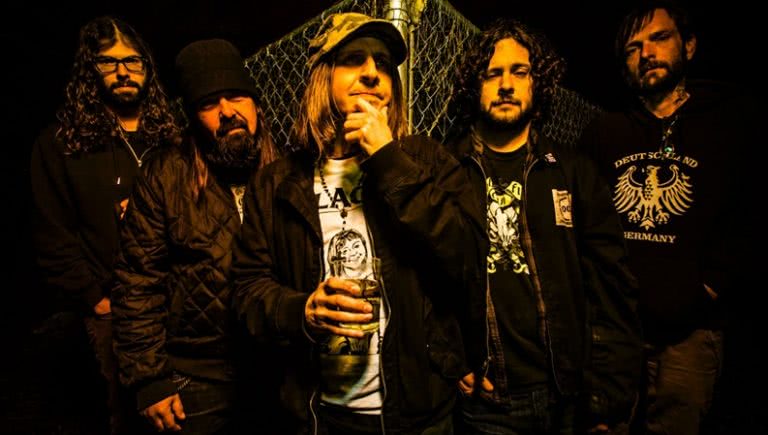In cosmic time, 14 years is a mere blip. In high-tech neoliberal society, 14 years is eons. Between the years 2000 and 2014, America let that goofy redneck George W. Bush have two terms of presidency. Following this, the USA twice voted in a progressive left-wing president, an African-American by the name of Barack Obama.
Meanwhile, Idols, X-Factors and robot voices have taken over the music world and it’s become increasingly apparent that Big Brother truly is watching us. This same 14-year stretch is how long it took for New Orleans hard rock dudes Eyehategod to produce a follow-up to their fourth LP, Confederacy Of Ruined Lives.
When the band’s fifth record – and its first self-titled release –finally arrived in May 2014, there was no indication that time had wearied the five-piece. “We knew that we would definitely put a record out one day. We just didn’t know when,” says vocalist Mike Williams. “Songs had been written, it was just a matter of getting our asses into a fuckin’ studio and putting down the tracks. It took us a while but we did it so we’re happy.”
Although Williams dismisses doubts concerning the band’s subsistence, Eyehategod endured a multitude of tumultuous experiences during that 14-year interval. In addition to several band members working on side projects – including Down, Outlaw Order and Arson Anthem – in 2005 Hurricane Katrina brought devastation to their hometown and Williams’ narcotics addiction landed him in jail for three months.
Despite all of this, by the time 2013 rolled around, Eyehategod looked in better shape than ever. Not only were they touring the globe in celebration of their 25th anniversary, but the band finally hit the studio to record album number five. However, tragedy struck in August 2013 when drummer Joey LaCaze passed away from respiratory failure. LaCaze’s death could easily have brought an end to Eyehategod, but the remaining foursome chose to stick with it and enlisted new sticksman Aaron Hill.
“I miss Joey tremendously,” says Williams. “The first couple of shows were weird, because I was always playing off Joey. But onstage, Aaron’s a part of the band. He’s a part of us now, so it’s not weird at all.”
Eyehategod are often cited as pioneers of sludge metal. Williams isn’t too pleased with this tag – “Everybody wants to call it sludge or some garbage like that, but it’s just rock’n’roll” – and you can understand why. ‘Sludge metal’ doesn’t account for the band’s implementation of blues riffs, Black Sabbath grooves, blasts of punk rock fury and Williams’ eye-popping vocal outbursts.
Taming these disparate elements to create a cohesive listening experience no doubt stipulates an advanced level of communication between band members. Yet despite the lengthy delay, Williams says Eyehategod came together without much difficulty.
“It’s not like there’s a set formula that we follow. We play the music that we like and the music that we want to be a part of, so it just comes naturally. We don’t force ourselves to play in a certain way. That’s who we are, so we couldn’t sound like any other band. It’s these people in the band, so we’re going to sound like Eyehategod. We’re not the type of band to go changing our sound and experimenting with our sound or anything weird like that.
“We knew on the first album what we wanted to sound like,” he adds, “but we weren’t quite adept enough to put it together properly. We were very naХve around studios and playing our instruments. But Take As Needed For Pain [1993] – that sounded like what we wanted to be. And I think we’ve been doing that ever since.”
Production-wise, Eyehategod is a cleaner-sounding work than most of the band’s earlier releases. In spite of this, the record actually hits a more ferocious extreme than previous outings. While the irrational outbursts never overwhelm, anger is a primary characteristic of all Eyehategod albums. “We’re just naturally pissed off, depressed people,” Williams says. “We’re a bunch of miserable bastards. There’s always something that’s going to make us angry. Until the day we die, I’m sure something’s going to piss us off here and there.
“It’s mostly just singing about human emotions and the way people feel. I think people relate to that stuff more than singing about a specific thing. [We sing about] depression or loss or poverty – just any type of human feelings.”
Eyehategod are determined to make up for last year’s cancelled Australian tour when they return for a run of shows later this month. And if any Aussie fans want to let their demons run wild, the band isn’t likely to take offence. “It’s nice to see people breaking shit and inciting minor riots at our shows,” Williams says. “We’re one of those bands: if a fight breaks out we’re not going to stop, we’re going to keep playing. Of course we want people to get angry and be a part of the music with us. It just goes with the territory – we can get aggression out.
“It’s a relationship with the audience. We feed off their energy too. I know a lot of bands say that, but it’s true, that’s how it works. If some kid’s punching himself in the face, it’s all the more reason to play harder and heavier and more aggressive.”
Eyehategod out now through Century Media. Catch them withI Exist, Lo! atManning BaronSaturday January 31,ticketsonline.

































